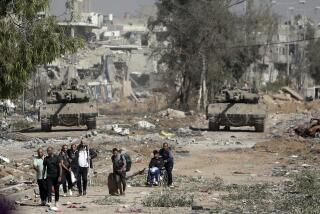As Iraq Conflict Changes, Has Bush Kept Up?
President Bush barreled straight ahead with old answers when ABC’s Elizabeth Vargas asked him a new question about Iraq last week. And like any driver who missed a turn in the road, the president quickly found himself in a ditch.
Vargas sensibly asked Bush how the growing civil strife in Iraq between the majority Shiites and the Sunnis who dominated the country under Saddam Hussein might change the U.S. mission there. Bush, to his credit, acknowledged the importance of encouraging Iraqis to form a “unity government” in the dangerously prolonged political haggling that has followed December’s election.
But the president gave no hint he’d considered how the widening gulf between Sunni and Shiite might alter America’s strategy. Instead, he summoned old sound bites, as if cueing them on tape. “The troops are chasing down terrorists,” he told Vargas. And: “As the Iraqis stand up, we will stand down.”
Those arguments reflect the model that Bush, his aides and most Americans have used to understand the war in Iraq. In that framework, Iraq -- like Vietnam -- is a contest between a central government and an insurgency determined to overthrow it.
But many experts are asking whether that construct really explains the challenge in Iraq anymore -- especially after the horrific sectarian violence that swept the country following the Feb. 22 bombing of a Shiite shrine in Samarra.
Larry Diamond, a senior fellow at the Hoover Institution and former advisor to the U.S.-led occupying authority in Iraq, concisely expressed the evolving view when he wrote in the latest issue of the New Republic: “Iraq is in the midst of a civil war.”
If Iraq is morphing from a struggle against insurgents into something more like a civil war between Sunnis and Shiites, Bush’s responses to Vargas raise more questions than they answer. What does “chasing down terrorists” mean when neighbors are killing neighbors? And does training the Iraqi forces to “stand up” point toward greater stability, or greater friction, when many Sunnis see the military as the weapon of the Shiites?
Bush isn’t alone in dodging those deeper questions. Few leaders in either U.S. party have said much about how growing civil strife in Iraq might change the calculus there for America. But the shift in the Iraq conflict is likely to scramble the U.S. debate in ways unpleasant for each side.
As Diamond notes, Iraq hasn’t descended to a Bosnia-like level of “total ethnic conflagration.” But, he says, the reciprocal violence between Sunni and Shiite, the intractable struggle over political power and the growth of private militias leave the U.S. and Iraq “staring at the prospect of something substantially worse” than the “gradual, creeping” civil strife that has bloodied the country over the last two-plus years.
Diamond isn’t alone in his fears. Many of the experts on civil conflict that writer Paul Starobin interviewed for a brilliant National Journal article see in Iraq the escalating spiral of fraternal grievance that characterizes civil wars. In Senate testimony last week, Lt. Gen. Michael D. Maples, director of the Defense Intelligence Agency, dissented, but only slightly.
“I do believe the underlying conditions are present,” Maples said, “but that we are not involved in a civil war at this time.”
Whether or not we label it civil war, no one disputes that the tension between Sunnis and Shiites jostling for power or settling old scores has become a central component of the challenge in Iraq. Maples acknowledged that “even moderate Sunni Arab leaders ... are pursuing a dual track policy of political engagement and armed resistance.”
Likewise, evidence is mounting that Shiite militias linked to government security forces are operating death squads against Sunnis. The United Nations’ former human rights chief in Iraq said last week that the militia fighters linked with the largest Shiite political party in Iraq “do basically as they please. They arrest people, they torture people, they execute people.... “
In this environment, fundamental assumptions about the war from left and right in the U.S. are becoming obsolete. The growing role of sectarian animosity in fueling Iraq’s violence threatens Bush’s calculation that strengthening the Iraqi defense capability is the key to restoring order and bringing home American troops.
That might work if the Iraqi army and police are seen as a neutral, national force committed to protecting all of their countrymen. But, as defense expert Stephen Biddle of the Council on Foreign Relations recently noted, since most Sunnis view the American-trained forces “as a Shiite-Kurd militia on steroids, what we end up doing is making [the Sunnis] even more frightened for their security in a future Iraq, which makes them prone to fight back harder rather than less so.”
At the same time, the war’s changing nature undermines the argument from many on the left that the U.S. presence is primarily fueling the violence. That seems increasingly untenable at a point when U.S. troops look like the only thing preventing Iraqis from tearing each other apart.
In this murky and volatile period, the analysts who look most prescient are those, like Sen. Carl Levin (D-Mich.), who have insisted that the U.S. use its leverage in Iraq to pressure all sides to reach political accommodations. U.S. Ambassador Zalmay Khalilzad has grown more forthright in sending that message too.
Bush now faces a paradox. As Iraq pulls apart, its need grows for American troops to serve as buffers and brokers. But as the sectarian violence rises, so will the pressure inside the U.S. to withdraw. However reluctantly, most Americans have not yet entirely abandoned the hope of building the Arab world’s first functioning democracy. But they will probably show much less patience for watching American soldiers die in the next Lebanon.
More to Read
Sign up for Essential California
The most important California stories and recommendations in your inbox every morning.
You may occasionally receive promotional content from the Los Angeles Times.










